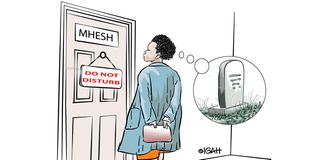No man should die for a politician

One election cycle after a man dies for a politician, his widow waits in a queue, from dawn to dusk, to avenge his death.
One minute after a man dies for a politician, there is a brief mention of the incident in the news. Because there are more important stories to cover, the death is forgotten in 15 seconds flat. Unless death has a ghastly angle.
The bereaved are in for the rudest shock of their lives. They will see the story and the body of their beloved splashed all over social media. Mourning in private – and peace – will be a luxury they won’t afford.
One hour after a man dies for a politician, the politician calls a press conference and condemns the death; circumstances notwithstanding. The politician flips the script. He claims the man was murdered by the state. Or the politician’s enemies. Or that he was a target of an assassination attempt, but the deceased ate lead in his stead.
If the bereaved are fortunate, they may be allowed a word in edgewise during the presser. But this is not about them or their dearly departed. They’re mere extras. The politician is the star. And the deceased is collateral damage.
One day after a man dies for a politician, his family commences burial arrangements. Mheshimiwa is busy. He sends Mtu wa Mkono with his contribution. But Mtu wa Mkono lives with the sick maxim; “a man eats where he works” – even if it’s prying bread from a dead man’s frozen fist. Like Mtu wa Mkono, like Mheshimiwa.
Three days after a man dies for a politician, the bereaved learns the truth. Via social media. Again. The politician brags how much dough he poured for a “befitting sendoff”. Relatives and friends alienate the deceased’s family, falsely accusing them of financial impropriety.
One weekend after a man dies for a politician, the politician and his entourage make a grand entrance to the burial. This posse has not come to condole with the bereaved, but conduct a ritual that’s the staple of Kenyan politicians; dancing on graves of poor people.
At the burial, the deceased’s family is barely acknowledged. Still, the politician pukes pledges. Plenty of putrid pledges. Which adds to his l-o-o-n-g list of dud pledges.
One month after a man dies for a politician, his family is in dire straits. They take comfort in the politician’s promises. But, as the cool ruler, Gregory Isaacs sang: “A (politician’s) promise is a comfort to a fool.”
The deceased’s family members call the politician. They hit redial. And then some. Surprise, surprise. Or, no surprise, really. They are blocked. But still.
One year after a man dies for a politician, the widow has grown moss – and gray unkempt hairs – while camping outside the politician’s office, but she can’t go past Mheshimiwa’s human shield; Mtu wa Mkono.
Two years after a man dies for a politician, his widow has learnt how the system works. She bids her time, while grinding to provide for her family. Her pride won’t allow her to beg no mortal man for bread.
She’s a legit Kenyan woman. Faith is her first name. Industrious is her surname. She industriously works her faith, and plucks her family off the ever-increasing beggars’ line. The only debt she owes is sleep. But that can wait three more years.
(One election cycle after a man dies for a politician, history repeats itself. Another man dies for a politician).
One election cycle after a man dies for a politician, his widow waits in a queue, from dawn to dusk, to avenge his death. She has waited five painful years for this moment. She clasps her scimitar with both hands. Her scimitar has the power to terminate whole careers and cyclic errors. Her scimitar is her voter’s card.
One election cycle after a man dies for a politician, his widow eventually has a good night’s sleep.





